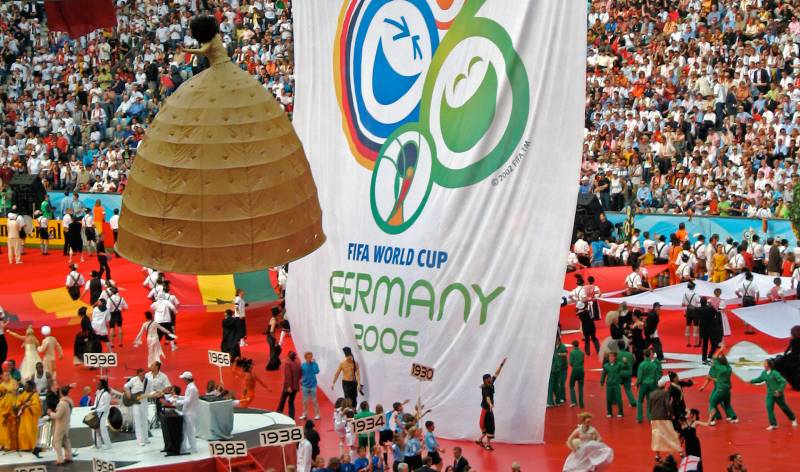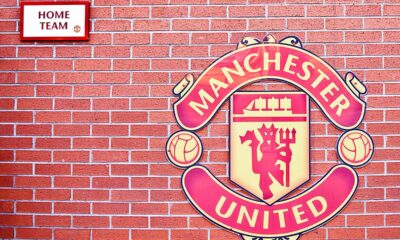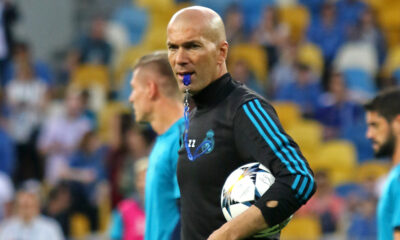Football
World Championship 2006 in Germany: Gold for Italy, the corruption scandal with the hosts or the famous Zidane vs. Materazzi incident
The 2006 World Championship was the eighteenth in history. This World Championship was hosted by Germany, although as it later turned out, the hosting itself was certainly no accident. The 2006 World Cup in Germany will forever be linked to a corruption scandal, but sportingly it has been etched in the hearts of fans. Unfortunately, the Czech national team did not make it out of the preliminary group, with Italy winning the gold.

The 2006 World Championship was the eighteenth in history. This World Championship was hosted by Germany, although as it later turned out, the hosting itself was certainly no accident. The 2006 World Cup in Germany will forever be linked to a corruption scandal, but sportingly it has been etched in the hearts of fans. Unfortunately, the Czech national team did not make it out of the preliminary group, with Italy winning the gold.
Munich, Gelsenkirchen, Dortmund, Hamburg, Berlin, Hannover, Frankfurt, Nuremberg, Cologne, Kaiseslautern, Leipzig, Stuttgart – these are the twelve cities where Germany hosted the 2006 World Cup.
As it happens, there is not a single championship that was not at least in some way affected by political aspects or outright some form of corruption scandal. And this world championship was no different.
The corruption scandal with the hosting
As I write above, the 2006 World Cup was hosted by Germany, but as the Football Leaks documents proved in later years, it was not a clean slate in terms of the hosting decision.
The Swiss prosecutor’s office, in addition to Football Leaks and Der Spiegel, as also reported by the BBC, accused former German officials involved in the organisation of the 2006 World Cup in Germany of fraud.
The case first made headlines in October 2015, when German news magazine Der Spiegel accused Germany of using a secret slush fund to buy FIFA votes in support of its bid to host the 2006 World Cup.
The money was allegedly provided by Louis-Dreyfus at the request of Franz Beckenbauer, who headed the committee seeking to win the right for Germany to host the event.
According to the prosecutors, the sum was a repayment of a loan Louis-Dreyfus made to Beckenbauer in 2002, which was used for various payments to a Qatari company.
However, in addition to Beckenbauer, the defendants also included two former presidents of the German Football Association (DFB), Wolfgang Niersbach and Theo Zwanziger, the former general secretary of the DFB, Horst Rudolf Schmidt, and Urs Linsi, as former general secretary of the international football federation FIFA.
“In April 2005, the defendants allegedly fraudulently misled the members of the DFB’s supervisory organ for the 2006 World Cup in Germany about the real purpose of a payment of approximately €6.7 million,” the prosecution said in a press release.
And after a raid by the tax authorities at the DFB headquarters, it was revealed that the payment in question was made to FIFA.
“The amount was first transferred from the DFB account, or rather from the 2006 World Cup, to FIFA’s account and on the same day FIFA transferred it as a simple payment to a Swiss account held by Robert Louis-Dreyfus (the late Adidas chief),” the statement also said.
Qualifiers
As far as the tournament itself is concerned, a total of 32 teams qualified for the tournament. Of these, 14 European, 8 American, 5 African, 4 Asian and Australia, as the representative of Oceania. As far as specific countries are concerned, South Korea, Saudi Arabia, Japan and Iran have all appeared in the tournament for Asia.
Within Africa, Tunisia, Angola, Ivory Coast, Ghana and Togo have qualified for the 2006 World Cup in Germany.
America had its main favourites in Brazil and Argentina. In any case, Ecuador, Paraguay, Mexico, Costa Rica and Trinidad and Tobago also participated in this championship. And as for the European representatives? This is clearly the longest list.
Czech Republic, Ukraine, Poland, Germany, Italy, France, Netherlands, Sweden, England, Portugal, Serbia and Montenegro, Switzerland, Croatia, Spain.
The Czech Republic is already finished in the group stage
Unfortunately, it was not a successful tournament for the Czech national team. In Group E, the Czechs faced the USA, Ghana and Italy, with the first match still going well. After two goals from Tomáš Rosický and one from Jan Koller, the Czech national team defeated the USA 3-0 to top Group E.
The Czech Republic, however, did not score a single goal in the next two matches and lost to Ghana (0: 2) and Italy (0: 2). It should be noted that Czech football was not in an ideal state at that time. And this was due to the power struggle, about which you will learn much more in our special attached above.
And not only about it, but also about Vlastimil Košt’ál’s tenure, the sacking of important people and the actual course of the 2006 World Cup in Germany from the perspective of the Czech team.
Portugal without a medal, the Germans won at least a bronze
The Portuguese seemed to get the most out of the 2006 tournament, even though they did not bring home any precious metal. They went through the main group without a single hesitation, and in the eighth round they knocked out the Netherlands 1:0 after a crazy run.
It should be noted, this match was really a disgrace of the whole championship and can be safely interpreted as a dugout. The referee drew 14 yellow cards and another 4 red cards, with the only goal deciding Portugal’s progress being Maniche.
Germany came through their preliminary group very similarly to Portugal, and therefore with full points. And they had no major problems with their opponents in the eighth round either. The Germans knocked out the Swedes 2:0, with two goals in the fourth and 12th minutes by Lukas Podolski.
The quarter-final then offered a hard-fought battle with Argentina, which was not decided in regulation time or extra time. With the score at 1-1, the Germans had to go to penalties and were more successful.
The Portuguese also had to go through a penalty shootout. They played to a goalless draw with England, but penalty kicks decided the Portuguese national team’s progress. In the semi-finals, Portugal lost to France (0:1) and Germany lost in extra time to Italy (0:2).
The two teams then faced each other in the battle for bronze, which was won by Germany. After two goals by Bastian Schweinsteiger and an own goal by Petit, the Germans were already 3:0 up, only to be reduced to two goals by Nuno Gomes at the end of the match.
Italy world champion, France silver
Italy, like Germany and Portugal, advanced from the first place in the group. France went through to the next stage of the tournament from second place, with the first place going to the Swiss.
It should be noted, for a really detailed run of the tournament, see our special attached above. Moreover, the experienced journalist Stanislav Hrabě personally attended the 2006 World Championship in Germany and thus adds some very interesting insights from behind the scenes of the championship.
The semi-final between Italy and Australia was surprisingly close, with Francesco Totti deciding the Italians’ progress in the 95th minute. And that was from a penalty. France, on the other hand, defeated a strong Spain 3-1.
And in the quarter-finals they also beat a star-studded Brazil team. A single goal by the then brilliant Thierry Henry was enough to advance. The Italians really got going in the knockout phase. Their form was taken away in the quarter-finals by Ukraine, who lost 0:3 to Totti and co.
And although the semi-final has already been mentioned above, we can go straight to the memorable final. It offered much, including the infamous incident between Zinedine Zidane and Marco Materazzi.
The 2006 World Cup Grand Final in Germany had to be decided by penalty kicks, in which all five Italian shooters succeeded. David Trezeguet was the only unsuccessful enforcer on the side, directing his shot into the crossbar. Fabio Grosso scored the decisive strike.
In the language of numbers…
Although the 2006 World Cup in Germany was marred by a corruption scandal, sportingly it was a great championship. The finals alone attracted just over 715 million spectators, with a total of 3 353 655 spectators in the stadiums.
That is an average of 52 401 fans per match. A total of 147 goals were scored (exactly 2.3 per game), with Miroslav Klose being the top scorer with five goals.
So, once again, if you want to know not only the detailed course of the tournament, but also Mr. Hraběte’s exclusive observations, please do not hesitate to visit our special attached above.
FIFA , ESPN










